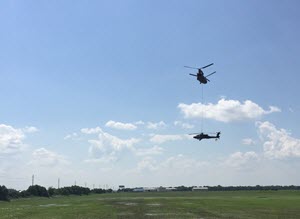Texas Guardsmen sling load Apache helicopter with Chinook
Story by: Capt. Martha Nigrelle
Posted: September 1, 2016
 Texas Guardsmen conduct recovery operations of an AH-64D Apache helicopter using a CH-47 Chinook helicopter, September 1, 2016, following a precautionary landing in a rice paddy in Wallisville, Texas, near Houston, due to mechanical issues. Maintenance soldiers from the 1st Battalion, 149th Aviation Regiment (Attack Reconnaissance) waded through six-inch deep mud and worked in a heat index of more than 100 degrees, to ensure a safe and successful sling load recovery mission. (U.S. Army National Guard photo by Capt. Martha Nigrelle)
Texas Guardsmen conduct recovery operations of an AH-64D Apache helicopter using a CH-47 Chinook helicopter, September 1, 2016, following a precautionary landing in a rice paddy in Wallisville, Texas, near Houston, due to mechanical issues. Maintenance soldiers from the 1st Battalion, 149th Aviation Regiment (Attack Reconnaissance) waded through six-inch deep mud and worked in a heat index of more than 100 degrees, to ensure a safe and successful sling load recovery mission. (U.S. Army National Guard photo by Capt. Martha Nigrelle)
HOUSTON - Texas Guardsmen conducted recovery operations of an AH-64D Apache helicopter using a CH-47 Chinook, Sept. 1, 2016, following a precautionary landing in a rice paddy in Wallisville, near Houston, due to mechanical issues.
Wading through six-inch deep mud, and working in 97 degree weather with 90 percent humidity, maintenance soldiers from the 1st Battalion 149th Aviation Regiment (Attack Reconnaissance) prepared the Apache for a sling-load recovery.
“This was fun,” said Staff Sgt. Mark Guillory, technical inspector and attack helicopter mechanic for the battalion. “For most of us, this is the first real-world sling load we’ve done. We have done it in training plenty, but you can’t beat this. This is the real thing.”
The pilots flying the aircraft initially made the precautionary landing after a warning light went off.
“They did the right thing,” said Guillory. “You get a warning light, you land, wherever you’re at.”
The soldiers on board the aircraft were not injured and were conducting a routine training mission when the landing occurred.
“I want to commend our pilots for their quick reaction and landing,” said Maj. Gen. William Smith, Deputy Adjutant-Army and commander of the Texas Army National Guard. “This was a potentially dangerous situation that demonstrates the caliber of our soldiers as they ensured the safety of the citizens in the local area.”
The unit’s leadership determined the safest way to move the helicopter would be by air, mitigating risk to nearby civilians and their property.
The only way to move a 12,000 pound aircraft via air is with something more than twice its size, something like a Chinook.
Using a universal maintenance aviation recovery kit, designed to move a downed aircraft from one location to another, Guillory and a dozen other maintenance soldiers worked to ensure that the Apache could be transported safely.
As the soldiers worked, a large crowd of nearby Texans gathered to watch the operation, to include a local judge who handed out cold water to the soldiers working, as well as the civilians watching.
“Everyone worked really well together; I thought they interfaced very well with the public,” said Judge Blake Sylvia, Chambers County Justice of the Peace. “From start to finish it was a really good operation.”
It took two attempts to get the Apache in the air. After fixing a small issue with their hook, the Chinook crew was able to successfully sling load the Apache and fly it 16 miles to the Baytown Airfield.
The maintenance soldiers met the two helicopters in Baytown and immediately went to work preparing the Apache for safety inspections and any necessary maintenance.
“That’s what we do,” said Guillory. “Make sure it’s safe to fly.”